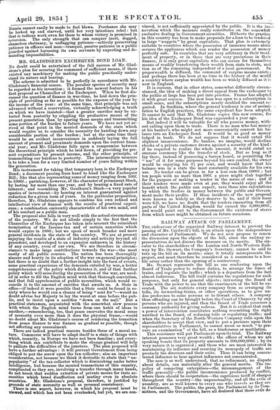TOPICS OF THE DAY.
NEWS FROM THE BALTIC.
THOSE who anticipated a " dashing blow" at Russia in the Baltic
would do well to read the first paper in Fraser's Magazine for May, which simply describes the naval and military geography of that twisted sea. The paper, indeed, is much more than an ordi- nary magazine article. Composed by one who has an intimate and detailed knowledge of the ground—who has been able to survey it, too, from the historical point of view, and from the most advan- tageous position accessible to an Englishman in Russia—it possesses an authenticity commonly allowed only to official papers ; it is tho- roughly practical in its purpose, clear and graphic in its language. An English fleet entering the closed sea will not encounter its only trials at the intricate entrance. The difficulty which our fleet had in venturing to pass the Sound with its shallow waters— the necessity for taking the more circuitous route by the Great Belt—formed only a foretaste of the obstructive navigation which increases as the capital of Russia is approached. Passing by the cliffs of Holstein, the sandy shores of Prussia the granite rocks of Swe- den,—leaving out of account the ice which walls up the water-way to the upper part of the Baltic in the greater part of the year,—let us take only what might be considered the more vulnerable points. We need not dwell much upon Riga and the entrance to the
Duna,—strongly fortified, though imperfectly manned, and not at present armed enough against attack to be without terrors at the name of Napier. The two parts of Russia that would seem to in- vite the desired blow are Finland, for its supposed disposition to return to Sweden, and its importance in a military point of view for approaching Russia by land; and the Gulf of Finland, the road, to St. Petersburg.
As to Finland, the province so dishonestly taken from Sweden in 1808, a priori it might be supposed that the inhabitants, whose ethnological sympathies with the Muscovites are small, would be ready enough to shake off the yoke, and return to their original fealty: but it will not do to trust in war to a priori reasoning. The Fins have a constitution secured to them for fifty years after the cession ; they have several privileges ; and there is no positive evidence of their Swedish tendencies. Moreover, the approaches are fortified by nature and the Czar. The entrance to the Gulf is. gated by that group of eighty islands which go by the general name of the largest, Aland ; an archipelago of islands, straits, reefs, bays, and banks, which laugh at the entrance of any craft but the galleys and gun-boats of old North warfare. To the East, on the Finnish coast, lies Helsingfors, and the fortified works which pass by the general name of Sven- borg ; and here lies a prize which might tempt the approach- ing Napier—eight sail of the line, a frigate, a corvette, and three steamers of the Russian Baltic fleet. But how to get at them P—Through the single passage to Helsingfors Bay between Langern and Vester Svert, a passage two hundred yards in width, raked by a fire from the two islands, with other batteries to be passed ; and commanded by the great works of Sveaborg,—a pile of battery upon battery, such as Sir Archibald Alison, says the writer, can alone describe ; such, it would seem, as a John Martin alone could paint, under the inspiration of some military furor. Each series of works is com- plete in itself as regards stores of all kinds and bomb-proof cover. The batteries are formidable, both because they are unassailable in the baldness of the rocks from which they are carved, and because they have the heaviest ordnance. Between Sveaborg and Revel lies the narrow entrance to the Gulf of Finland ; whose shores recede from each other, to meet again nearer Cronatadt, at the entrance of the estuary of the Neva. Well, if the fleet lying in the Bay of Helsingfors cannot be seized, let the blow be struck upon St. Petersburg itself ; and the Scandinavians of the Baltic provinces, taught to know that their Czar is not invulnerable, may be shaken from their allegiance by that one vigorous act of Napieresque daring. But how to get in?
There is, no doubt, the choice of two channels ; but the Northern is closed with a double or triple row of piles, five or six miles in length, which renders it accessible only to small craft. It is Hobson's choice, therefore ; and, taking the other channel, the adventurous sea captain, on invasion bent, will have to steer his ship between Fort Alexander on the left and Risbank on the right, each 800 yards distant, each built of granite and bristling with heavy guns : then come Fort Peter and the timber fort of Cronalott—the last of no formidable character : but then again the adventurer enters " the Little Road," a passage 250 yards wide, commanded by Cronslott, the Mole Head, and the cube granite- built Fort Menzikoff, with its 150 guns. Beyond, in the narrow- ing channel, lies a vista of land fortifications not practically im- portant : no fleet in goose's file is likely to enter there, save as the Russian Admiral effected his entrance into Helsingfors, when a Swedish Admiral capitulated—by force of golden artillery.
Here, then, is the strength of Russia. She is a great hedgehog.
Her means of offence is not alarming : her seventy-two ships of all sizes in her Baltic and Euxine fleets, commanded by generals, with captains who wear spurs, and gunners who place less than one shot in a dozen—a Napier could easily put such a fleet under his arm and present it to a British museum. But to be conquered, Russian ships must come out—and they show no impatience to be conquered. Russian fleets steal victories from English foes by stopping in-doors ; and it is a winning game for the spurred sailors. A mammoth hedgehog, with a more than rhinoceros hide of granite,
Russia cannot easily be made to feel blows. Perchance she may be locked up and starved, until her very intestines rebel : but that is tedious work even for those to whom victory is promised in reversion. The only strength that can conquer inert, dogged, i shameless obstinacy, is unflagging patience—actively persevering patience in officers and men—tranquil, passive patience in a public guarded against harassing its own servants by expecting and de- manding impossibilities.



























 Previous page
Previous page